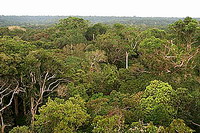American military contractors are held by leftist rebels in bad conditions
The mother of one of three American military contractors kidnapped by leftist rebels in 2003 was heartbroken to learn from an escaped captive that her son is suffering from hepatitis deep in the Amazon jungle.

"I knew in my heart he was alive, but I didn't know he was sick," said Jo Rosano, mother of Marc Gonsalves, in a telephone interview with The Associated Press from her home in Bristol, Connecticut.
Police officer Jhon Frank Pinchao on Wednesday told journalists he had fled from the same jungle camp where the Americans and former Presidential candidate Ingrid Betancourt were being held.
Pinchao said he last saw the high-profile hostages on April 28, the day he took advantage of a lapse by his captors to flee to freedom after more than eight years in captivity. After surviving 17 days in the jungle, Pinchao was found Wednesday by an anti-narcotics police patrol near the southeastern frontier town of Mitu.
He said Gonsalves was suffering from hepatitis, but not did not provide any more details about the man's condition or that of 11 other hostages held with him, among them a kidnapped senator and other police officers.
Pinchao's account is the first direct confirmation the Americans remain alive since August 2003, when Rosano received a "proof of life" video several months after Gonsalves and two colleagues, Tom Howes and Keith Stansell, were captured by the Revolutionary Armed Forces of Colombia, or FARC.
The three Northrop Grumman Corp. contractors were on a drug surveillance mission in Colombia's cocaine-producing southern jungle when their plane crashed on Feb. 13, 2003.
Rosano said she received an e-mail message last week indicating her son was alive. The message, in broken English, was relayed by someone she doesn't know.
Betancourt, a congresswoman who denounced corruption, was kidnapped on Feb. 23, 2002, while campaigning for president in the south. A dual French-Colombian citizen, she has become a cause celebre in Europe.
Pinchao was undergoing medical treatment Thursday as relatives and friends gathered at his mother's home in a poor neighborhood in Bogota.
"It's like being reborn," said Marisol Pinchao, one of five sisters of the former hostage. "Although we never gave up hope he was alive, it's been four years since we received any proof of life."
At a news conference Wednesday, Pinchao held up a thin metal chain similar to one that was tightened around his neck and tied to another prisoner for months at a time.
"I hope it's not my fault that the others face difficulties now," Pinchao said, breaking into tears.
Pinchao, who missed the birth of his child during his captivity, said he and the other hostages were moved to new camps every three or four months.
In one of those jungle marches, he came across Clara Rojas, Betancourt's campaign manager. He said Rojas had given birth in captivity to a child named Emmanuel, confirming reports last year by a Colombian journalist, who said a guerrilla was the child's father.
Pinchao was kidnapped in November 1998, when 700 rebels attacked and held the frontier Amazon town of Mitu for three days, killing 53 people and taking another 61 hostage. All but seven of the hostages had been released.
The FARC is seeking to exchange the Americans, Betancourt and some 60 other prisoners for hundreds of jailed rebels.
But fitful talks over a humanitarian exchange have stalled over the government's refusal to grant rebel demands for a Switzerland-sized safe haven.
Subscribe to Pravda.Ru Telegram channel, Facebook, RSS!


